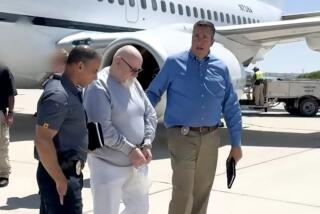Woman Guilty of Murder in State’s First Case Based on Genetic Evidence
- Share via
VENTURA — A 35-year-old woman was found guilty of first-degree murder Wednesday in a case that involved the first use of so-called “genetic fingerprinting” evidence in a California court.
The guilty verdict handed down by Superior Court Judge Lawrence Storch paves the way for an appellate court review of the controversial procedure, which could legitimize the use of genetic evidence in courts throughout the state.
Scientists say they can translate the genetic makeup of tissues into DNA patterns that resemble supermarket bar codes. DNA, which stands for deoxyribonucleic acid, is found in all human cells. Some experts contend that the chances of two people having the same DNA structure are more than a billion to one.
Storch said he relied on the results of DNA tests to conclude that 35-year-old Lynda Axell fatally stabbed 63-year-old George White during an attempted robbery at a Ventura hamburger stand on Feb. 24, 1988.
“The DNA evidence in this case was critical to the court’s finding of guilty. Without the DNA test results, there’s not enough evidence,” Storch said at the conclusion of the six-month, non-jury trial.
Storch’s decision, which will be appealed by Axell’s attorneys, is expected to be cited by law enforcement officials throughout the state.
DNA typing, which matches the genetic makeup of a suspect with tissue samples found at a crime scene, was developed four years ago in Great Britain and is already admissible as evidence in 18 U.S. states.
11 Experts Testified
The Ventura County district attorney’s office, which spent 18 months researching DNA “fingerprinting,” brought in 11 experts to testify on DNA evidence in a lengthy hearing that put the reliability of genetic fingerprinting itself on trial.
Richard Roberts, a molecular biologist who is assistant director for research at Cold Spring Harbor Laboratory in New York, testified that DNA patterns from hair belonging to Axell matched DNA patterns from 15 hairs found at Top Hat Burger, where White was murdered.
While law enforcement officials hail DNA fingerprinting as a breakthrough in solving crimes, critics say much about the technology remains unknown.
James M. Farley, one of the attorneys representing Axell, compared genetic fingerprinting to lie detectors, voice analysis and other techniques that were initially hailed as breakthroughs but later proved unreliable in court.
He said the process remains relatively untested and he maintained that some of the experts who testified at the trial have a financial interest in seeing DNA evidence used throughout California because they work for firms that conduct the testing.
Axell’s attorneys said her conviction was based on “circumstantial evidence.”
“If Lynda Axell was there, it doesn’t mean she committed a murder. There’s a lot of unanswered questions here,” said Willard P. Wicksell, Axell’s other attorney.
The defense also sought to discredit the statements of several Axell relatives, who told police that Axell had confessed to White’s murder. The attorneys claimed that the relatives, who later recanted their statements, only wanted to collect a reward offered by police.
In addition, a 9-year-old boy who was standing outside the Top Hat Burger on the morning of the murder testified that said he saw two men fighting inside the stand, not a man and a woman.
Axell was working at a costume shop across the street from the Top Hat on the morning of the murder and admitted to police that she was using cocaine heavily during that time. Through her attorneys, she has denied the killing.
Storch set a sentencing date of Oct. 18. Axell faces a maximum sentence of life in prison and a minimum of 17 years, after which she could be eligible for parole.
Axell has a 17-year-old son who is now serving a term for assault. While awaiting trial for White’s murder, Axell also gave birth to twins.
Other Cases
A number of California cases that seek to use DNA evidence are already wending their way through the courts. Los Angeles County Dist. Atty. Ira Reiner and state Atty. Gen. John K. Van de Kamp have used testimony from the Axell trial to bolster their own cases.
More to Read
Sign up for Essential California
The most important California stories and recommendations in your inbox every morning.
You may occasionally receive promotional content from the Los Angeles Times.













